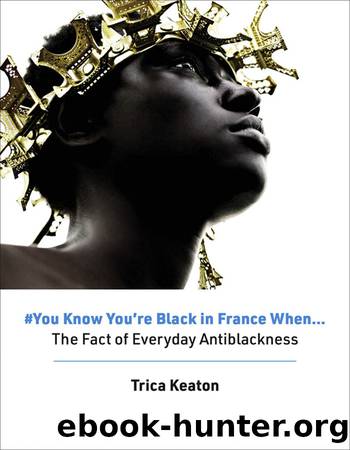#You Know You're Black in France When: The Fact of Everyday Antiblackness by Trica Keaton

Author:Trica Keaton [Keaton, Trica]
Language: eng
Format: epub
Tags: Police Violence; Racism; race, racialization; Antiblack; Antiblackness; Everyday racism; Franz Fanon; Black Studies; Black Diaspora; Raceblindness; France; French society; activism; Visual culture; Antiracism; antiracist
Publisher: MIT Press
Published: 2023-01-23T00:00:00+00:00
Setting a Context
Of all the protest chants that I have heard in France at antiracism demonstrations against police violence, the one that seems to hit law enforcers the hardest is: âEveryone hates the police!â (Tout le monde déteste la police). This mantra of defiance is particularly potent when coming from surviving families and the primary prey of everyday predatory policing in French society, namely boys and young men racialized-as-arab and black. I focus on them in this chapter not only because they are twenty times more likely to be stopped by the police than any other group, but also because of the manner that they are preyed upon which sets them frighteningly apart, as illustrates Corentinâs epigraph.4 My interviews with victims, advocates, and grassroots activists, alongside what I have witnessed and experienced, tell a story that is eerily reminiscent of cases in the United States. The difference is one of degree, not often of kind. My aim is not only to document abusive policing practices but also to draw needed international attention to an alarming, unaddressed, and under-analyzed pattern that results from everyday police violence: a logic of running not to but from the French police. I argue that it is not only logical but in the best interests of boys and young men targeted in abusive policing to flee and hopefully not get caught. Far from being an admission of wrongdoing or guilt, they are running from direct, intergenerational, intersectional, and vicarious experiences with the âceremony of degradation,â as I heard it termed by a key informant whom I call Corentin. They are running because they understand the lessons delivered through daily encounters with racist police violence and police who operate with impunity: their lives have less value in French society.
Police violence against girls, young women, and gender non-conforming people are also sites of needed study in France and Europe more broadly, but these under-documented lived experiences were not the focus of my research. However, a paucity of existing data show that young women and girls of African descent are also killed at the hands of law enforcement in France, and that their experiences are not often reported nor taken seriously, as is generally the case when reporting abusive policing.5 This invisibility, as sociologist Patricia Hill Collins writes, locks girls and women of color into spheres of isolation and vulnerability.6 Yet they are visible in their roles as mothers, sisters, aunts, and daughters, that is, as the surviving family members who demand âtruth and justiceâ for loved ones killed, maimed, and traumatized by this long-standing systemic problem in France.
The police force is centralized at the national level and overseen by the French Ministries of the Interior, Defense, and at local municipalities, which for advocacy groups means that the state and these state actors are responsible for the conduct and misconduct of their police. The police force is comprised mainly of the Police nationaleânotably its Brigade Anti-Criminalité, infamously known as the BAC in at risk outer citiesâthe Gendarmerie nationale, and
Download
This site does not store any files on its server. We only index and link to content provided by other sites. Please contact the content providers to delete copyright contents if any and email us, we'll remove relevant links or contents immediately.
| Americas | African Americans |
| Civil War | Colonial Period |
| Immigrants | Revolution & Founding |
| State & Local |
In Cold Blood by Truman Capote(3378)
The Innovators: How a Group of Hackers, Geniuses, and Geeks Created the Digital Revolution by Walter Isaacson(3169)
Steve Jobs by Walter Isaacson(2891)
All the President's Men by Carl Bernstein & Bob Woodward(2370)
Lonely Planet New York City by Lonely Planet(2219)
And the Band Played On by Randy Shilts(2199)
The Room Where It Happened by John Bolton;(2153)
The Poisoner's Handbook by Deborah Blum(2135)
The Innovators by Walter Isaacson(2099)
The Murder of Marilyn Monroe by Jay Margolis(2095)
Lincoln by David Herbert Donald(1983)
Being George Washington by Beck Glenn(1930)
A Colony in a Nation by Chris Hayes(1928)
Under the Banner of Heaven: A Story of Violent Faith by Jon Krakauer(1797)
Amelia Earhart by Doris L. Rich(1691)
The Unsettlers by Mark Sundeen(1682)
Dirt by Bill Buford(1671)
Birdmen by Lawrence Goldstone(1662)
Zeitoun by Dave Eggers(1645)
